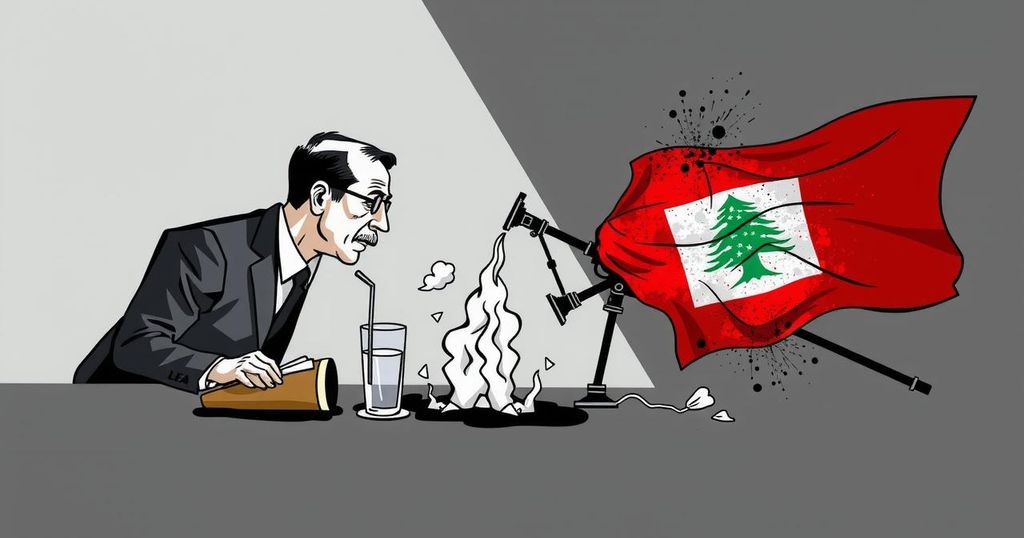Israel and Lebanon are reportedly nearing a ceasefire deal, with key terms including a 60-day truce, the withdrawal of Israeli forces, and ending Hezbollah’s presence in southern Lebanon. Amid rising tensions and exchanges of fire, progress has been made in negotiations, with the Lebanese Army expected to increase its presence in vacated areas. However, domestic opposition in Israel poses challenges to finalizing the deal.
Recent developments indicate that Israel and Lebanon are nearing a ceasefire agreement, with Israeli officials confirming that a cabinet meeting is scheduled for Tuesday to address this matter. The proposed truce, expected to last 60 days, aims to halt the ongoing conflict with Hezbollah, the Iranian-supported Lebanese militia. Key elements of the arrangement involve the withdrawal of Israeli troops from southern Lebanon and the cessation of Hezbollah’s activities in that region.
Tensions have flared in recent weeks, with increased exchanges of artillery fire as both parties negotiate the ceasefire’s specifics. On Sunday, for instance, approximately 250 projectiles were reportedly launched from Lebanon toward Israel, though most were intercepted. Concurrently, Israeli air raids targeting Hezbollah facilities in Lebanon continued.
An anonymous Western diplomat stated that the deal would entail augmented deployments of the Lebanese Army in areas vacated by Israeli forces and Hezbollah. Lebanese Deputy Parliament Speaker Elias Bou Saab remarked to Reuters that there are “no serious obstacles” remaining for a ceasefire. A key issue regarding the monitoring of the truce has been addressed, with a committee formed to oversee the agreement, comprising representatives from five countries, including France and chaired by the United States.
Nevertheless, Israel has maintained the need for conditional military action should Hezbollah re-establish a presence in southern Lebanon. Such stipulations have raised concerns among both Hezbollah and the Lebanese government, particularly regarding Israel’s right to re-enter Lebanon.
Negotiations have progressed to assuage fears concerning the enforcement of the ceasefire, taking into consideration the limitations of the UN Interim Force in Lebanon and the Lebanese Army. However, domestic opposition in Israel, particularly from hardline figures like National Security Minister Itamar Ben Gvir, poses challenges. He publicly criticized a ceasefire deal, asserting it would represent a “grave mistake” and suggested the current military advantage against Hezbollah could be a pivotal moment to decisively weaken the group.
Since the escalation of hostilities in late September, Lebanese authorities have insisted that any terms for a ceasefire align with United Nations Security Council Resolution 1701, which concluded the 2006 conflict and called for the withdrawal of Hezbollah from specified regions. Yet, both nations have accused each other of failing to uphold the terms of past agreements.
Currently, the conflict has profoundly impacted Lebanon, with over 3,750 fatalities and a significant number of individuals displaced. On the Israeli side, the ongoing attacks have led to injuries and infrastructural damage in several regions, including near metropolitan areas.
The situation between Israel and Lebanon has markedly escalated since late September 2023 due to recurring conflicts primarily driven by Hezbollah’s activities. Historically, tensions in this region have been fueled by various territorial and military disputes, notably since the 2006 war, with continuing implications for both nations. The current negotiations for a ceasefire come after intense military engagements, indicating a desperate need to establish peace and avoid further humanitarian crises in both Israel and Lebanon.
In summary, Israel and Lebanon appear to be on the brink of finalizing a ceasefire deal after intense negotiations that seek to address the ongoing conflict with Hezbollah. While significant progress has been made towards establishing terms for a truce, the situation remains precarious with potential domestic opposition in Israel and unresolved concerns regarding ceasefire enforcement. Continued dialogue and adherence to international agreements will be crucial for achieving lasting peace in the region.
Original Source: www.bbc.co.uk







